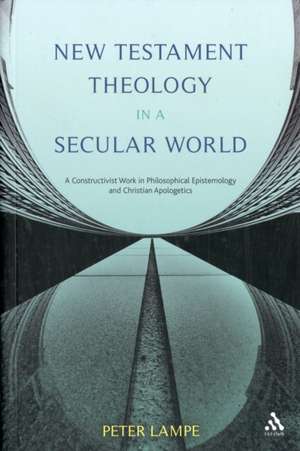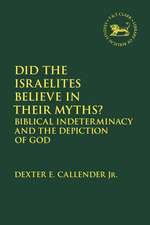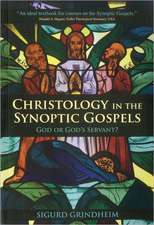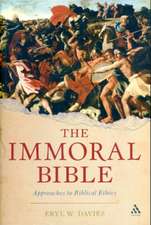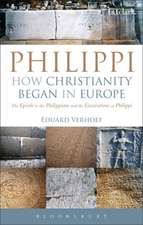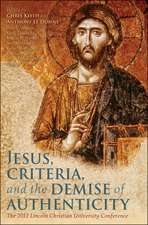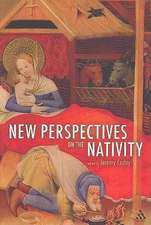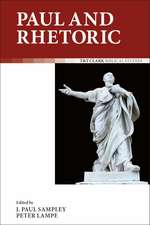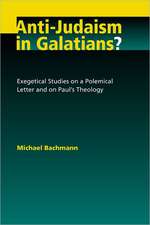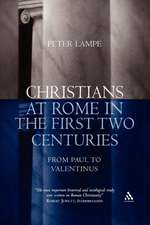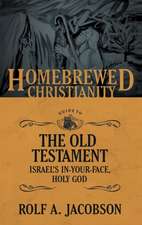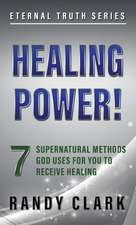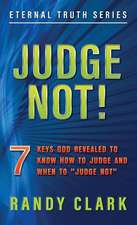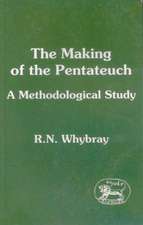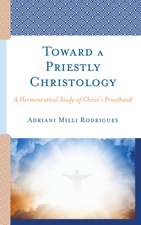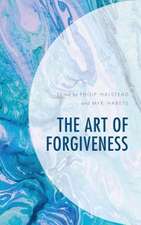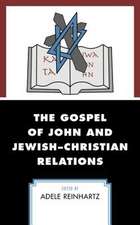New Testament Theology in a Secular World: A Constructivist Work in Philosophical Epistemology and Christian Apologetics
Autor Peter Lampe Traducere de Professor Robert L. Brawleyen Limba Engleză Paperback – 25 ian 2012
New
Testament
Theology
in
a
Secular
World is
an
important
and
original
new
work
in
Christian
apologetics.
It
is
the
first
book
to
apply
constructivist
theory
to
biblical
studies.
Biblical Studies scholar Peter Lampe tackles head on such questions as: What do we understand by "reality?" How does this relate to what theology calls the "reality of God" or the "reality of resurrection?" How can we account for the concept of "revelation"? Lampe argues that in talking about "reality" theologians must make an effort to engage with the concept of "reality" as it is discussed in the fields of philosophical epistemology and sociology of knowledge. However, as Lampe shows, Theology has so far hardly or only reluctantly participated in this dialogue.
Biblical Studies scholar Peter Lampe tackles head on such questions as: What do we understand by "reality?" How does this relate to what theology calls the "reality of God" or the "reality of resurrection?" How can we account for the concept of "revelation"? Lampe argues that in talking about "reality" theologians must make an effort to engage with the concept of "reality" as it is discussed in the fields of philosophical epistemology and sociology of knowledge. However, as Lampe shows, Theology has so far hardly or only reluctantly participated in this dialogue.
| Toate formatele și edițiile | Preț | Express |
|---|---|---|
| Paperback (1) | 257.97 lei 3-5 săpt. | |
| Bloomsbury Publishing – 25 ian 2012 | 257.97 lei 3-5 săpt. | |
| Hardback (1) | 948.75 lei 6-8 săpt. | |
| Bloomsbury Publishing – 25 ian 2012 | 948.75 lei 6-8 săpt. |
Preț: 257.97 lei
Preț vechi: 296.22 lei
-13% Nou
Puncte Express: 387
Preț estimativ în valută:
49.36€ • 51.81$ • 40.97£
49.36€ • 51.81$ • 40.97£
Carte disponibilă
Livrare economică 20 martie-03 aprilie
Preluare comenzi: 021 569.72.76
Specificații
ISBN-13: 9780567388889
ISBN-10: 0567388883
Pagini: 218
Dimensiuni: 156 x 234 x 15 mm
Greutate: 0.39 kg
Editura: Bloomsbury Publishing
Colecția T&T Clark
Locul publicării:London, United Kingdom
ISBN-10: 0567388883
Pagini: 218
Dimensiuni: 156 x 234 x 15 mm
Greutate: 0.39 kg
Editura: Bloomsbury Publishing
Colecția T&T Clark
Locul publicării:London, United Kingdom
Caracteristici
Peter
Lampe
is
a
biblical
scholar
engaging
in
an
original
way
with
a
long
running
debate:
Christian
apologetics
(i.e.
the
defence
of
Christianity
against
its
opponents).
Notă biografică
Peter
Lampeis
Professor
and
Chair
of
New
Testament
at
the
University
of
Heidelberg,
Germany.
Robert
L.
Brawley
is
Professor
of
New
Testament
Emeritus
at
McCormick
Theological
Seminary,
Durham,
North
Carolina,
USA.
Cuprins
I.
Introduction-Indicating
the
Problem
II. Stages in the History of Thought on the Way to Constructivism
1. Between Naïve Realism and Ontological Idealism
1.1 Epistemological Idealism
1.2 Epistemological Realism
1.3 Problems of Representation Theories, Ontological Idealism
1.4 Linking Ontological Realism and Epistemological Idealism
1.5 Further Problems of Realism's Correspondence Theory
1.6 The Collapse of Logical Empiricism
2. On the Concept of Truth
2.1 Ontic Truth
2.2 Truth as Object-Subject Correspondence
2.3 Subjective Truth
2.3.1 Truth Immanent in Language, Propositional Logic
2.3.1.1 Coherence
2.3.2 The Linguistic-Pragmatic Concept of Truth
2.3.3 The Pragmatic Concept of Truth
2.4 Parallel Moves toward the Subjective
III. The Brain as a Designer
1. Neurophysiological Arguments for Constructivism
2. Does an External Ontic Reality Exist?
3. The "Other," the "Self," and the Freedom of the Will as Reality Constructed by the Brain?
4. Gaps between Scientific and Everyday-Knowledge Constructs of Reality
IV. Objectivity as Intersubjectivity-The Interface with Sociology of Knowledge
V. A Constructivist Sociology of Knowledge Model
VI. Implications for Theological Discussion
1. On the non-Absolute Character of Theological Speech
2. Human Interaction with a Cognitive Model of God?
3. Ontological Equality of Diverse Constructs of Reality as a Prerequisite of Intercontextual Dialogue and Competition
VII. Application of the Model to Early Christian Examples-The New Reality of the Early Christians.
1. The Resurrection of Jesus
1.1 The Axiom of the Early Christian Context
1.2 Presettings
1.3 The Axiomatic Laying of a Foundation
1.4 Immediate Organizational Implications
1.5 The Wider Development of the Axiomatically Founded Context
1.6 An Argument within the Discipline of History?
2. The Irrelevance of Worldly Distinctions
2.1 The New Context of Galatians 3:28 as Intersubjective Shared Reality
2.2 Commuters between Two Contexts
2.3 A Defiant Escape from the Two Worlds: The Revelation of John
2.4 Irenic Rapprochement of the Two Contexts
3. The "New Creation" of the Human Being
3.1 An Ontological Proposition?
3.2 Evidence through Cognitive Construction (Baptism)
3.3 Evidence through Experience (Baptism, Experiences of the Spirit)
3.4 Evidence through Repeated, Institutionalized Experience (Worship, Eucharist)
3.5 Evidence through Experience that Grasps All Participants of a Context and through the Resultant Social Confirmation
3.6 Evidence through Emotional Experience
4. The Eucharist
4.1 Chains of Cognitive Constructions
4.2 All Sources of Evidence
5. New Orientation of Behavior
5.1 The Indicative of the Constructed Reality and the Imperative
5.2 Constructed Reality in Performative and Descriptive Modes of Speech
5.3 The Ethos Resulting from Paul's Theology of the Cross
6. A Swing Back- Jesus of Nazareth's Proclamation of the Kingdom in Word and Deed
6.1 Jesus' Reality of God
6.2 Sources of Evidence
6.2.1 Sensory Perception and Emotional Experience
6.2.2 Social Confirmation
6.2.3 Cognitive Construction as a Result of Hearing the Parables
6.2.3.1 The Basileia of God in the Tradition before Jesus
6.2.3.2 The Parable of the Leaven as a Case in Point
7. Prospects
7.1 Consequences for the Historiography of Theology
7.2 Hermeneutical Consequences
7.3 A Final Note on the Concept of Revelation
VIII. Rather than ens intellectui concordat only intellectus intellectui concordat? A Normative Sketch on the Concept of Reality and on Intercontextual Competition in a Pluralistic Society.
IX. The Prospect for a Constructivist Theory of Historiography
X. Appendix to VII.1.2: Life after Death in Selected Texts in Ancient Judaism
XI. Selected Bibliography
XII. Index
1. Index of Subjects and Persons
2. Index of References
II. Stages in the History of Thought on the Way to Constructivism
1. Between Naïve Realism and Ontological Idealism
1.1 Epistemological Idealism
1.2 Epistemological Realism
1.3 Problems of Representation Theories, Ontological Idealism
1.4 Linking Ontological Realism and Epistemological Idealism
1.5 Further Problems of Realism's Correspondence Theory
1.6 The Collapse of Logical Empiricism
2. On the Concept of Truth
2.1 Ontic Truth
2.2 Truth as Object-Subject Correspondence
2.3 Subjective Truth
2.3.1 Truth Immanent in Language, Propositional Logic
2.3.1.1 Coherence
2.3.2 The Linguistic-Pragmatic Concept of Truth
2.3.3 The Pragmatic Concept of Truth
2.4 Parallel Moves toward the Subjective
III. The Brain as a Designer
1. Neurophysiological Arguments for Constructivism
2. Does an External Ontic Reality Exist?
3. The "Other," the "Self," and the Freedom of the Will as Reality Constructed by the Brain?
4. Gaps between Scientific and Everyday-Knowledge Constructs of Reality
IV. Objectivity as Intersubjectivity-The Interface with Sociology of Knowledge
V. A Constructivist Sociology of Knowledge Model
VI. Implications for Theological Discussion
1. On the non-Absolute Character of Theological Speech
2. Human Interaction with a Cognitive Model of God?
3. Ontological Equality of Diverse Constructs of Reality as a Prerequisite of Intercontextual Dialogue and Competition
VII. Application of the Model to Early Christian Examples-The New Reality of the Early Christians.
1. The Resurrection of Jesus
1.1 The Axiom of the Early Christian Context
1.2 Presettings
1.3 The Axiomatic Laying of a Foundation
1.4 Immediate Organizational Implications
1.5 The Wider Development of the Axiomatically Founded Context
1.6 An Argument within the Discipline of History?
2. The Irrelevance of Worldly Distinctions
2.1 The New Context of Galatians 3:28 as Intersubjective Shared Reality
2.2 Commuters between Two Contexts
2.3 A Defiant Escape from the Two Worlds: The Revelation of John
2.4 Irenic Rapprochement of the Two Contexts
3. The "New Creation" of the Human Being
3.1 An Ontological Proposition?
3.2 Evidence through Cognitive Construction (Baptism)
3.3 Evidence through Experience (Baptism, Experiences of the Spirit)
3.4 Evidence through Repeated, Institutionalized Experience (Worship, Eucharist)
3.5 Evidence through Experience that Grasps All Participants of a Context and through the Resultant Social Confirmation
3.6 Evidence through Emotional Experience
4. The Eucharist
4.1 Chains of Cognitive Constructions
4.2 All Sources of Evidence
5. New Orientation of Behavior
5.1 The Indicative of the Constructed Reality and the Imperative
5.2 Constructed Reality in Performative and Descriptive Modes of Speech
5.3 The Ethos Resulting from Paul's Theology of the Cross
6. A Swing Back- Jesus of Nazareth's Proclamation of the Kingdom in Word and Deed
6.1 Jesus' Reality of God
6.2 Sources of Evidence
6.2.1 Sensory Perception and Emotional Experience
6.2.2 Social Confirmation
6.2.3 Cognitive Construction as a Result of Hearing the Parables
6.2.3.1 The Basileia of God in the Tradition before Jesus
6.2.3.2 The Parable of the Leaven as a Case in Point
7. Prospects
7.1 Consequences for the Historiography of Theology
7.2 Hermeneutical Consequences
7.3 A Final Note on the Concept of Revelation
VIII. Rather than ens intellectui concordat only intellectus intellectui concordat? A Normative Sketch on the Concept of Reality and on Intercontextual Competition in a Pluralistic Society.
IX. The Prospect for a Constructivist Theory of Historiography
X. Appendix to VII.1.2: Life after Death in Selected Texts in Ancient Judaism
XI. Selected Bibliography
XII. Index
1. Index of Subjects and Persons
2. Index of References
Recenzii
'A
fascinating
approach
to
the
New
Testament.'
-
Dr.
Eun-Geol
Lyu,
Hoseo
University,
Korea
'Convincing, profound, innovative and in its interdisciplinary character courageous. The study casts new light on the New Testament as a foundation document of the Christian concept of reality.' - Dr. Christian Strecker in Theologische Literaturzeitung.
'A meritorious, important tool, abounding in perspectives. Lampe shows how helpful it is to use constructivism for epistemological groundwork-both in the dialogue between theology and other scholarly disciplines, and in the inner theological discourse. Worth not only to be read but to be studied.' - Dr. Michael Gärtner in Pfaelzisches Pfarrerblatt, a journal for pastors.
Listed in 'new titles just published' section of the Church Times.
'Convincing, profound, innovative and in its interdisciplinary character courageous. The study casts new light on the New Testament as a foundation document of the Christian concept of reality.' - Dr. Christian Strecker in Theologische Literaturzeitung.
'A meritorious, important tool, abounding in perspectives. Lampe shows how helpful it is to use constructivism for epistemological groundwork-both in the dialogue between theology and other scholarly disciplines, and in the inner theological discourse. Worth not only to be read but to be studied.' - Dr. Michael Gärtner in Pfaelzisches Pfarrerblatt, a journal for pastors.
Listed in 'new titles just published' section of the Church Times.
